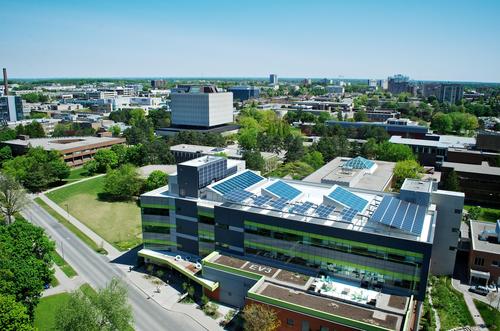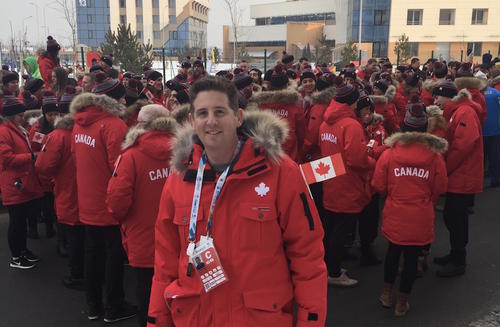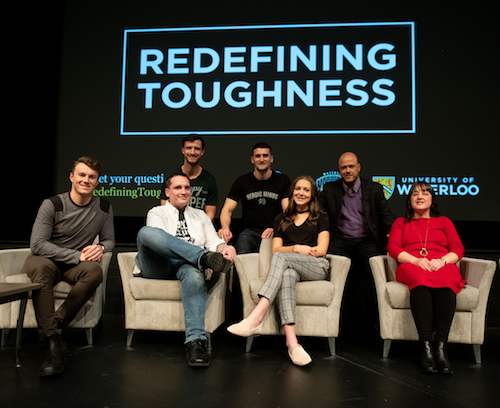The Daily Bulletin is published by Internal and Leadership Communications, part of University Communications
Contact us at bulletin@uwaterloo.ca
Submission guidelines
Editor:
Brandon Sweet
University Communications
bulletin@uwaterloo.ca

Students, staff, and faculty are invited to share their thoughts and feedback on the development of Waterloo’s Climate and Energy Action Plan (CEAP).
The CEAP is the University’s first campus climate action plan, and will develop a roadmap and series of strategies and approaches to reduce Waterloo’s carbon emissions, aiming for the University to become carbon neutral by 2050.
The action plan will support several commitments made by the University of Waterloo, including:
Led by the Climate and Energy Working Group of the President’s Advisory Committee on Environmental Sustainability, a series of four Open Houses will take place across campus next week to provide background information on the plan, and encourage participants to share thoughts, ideas, and feedback on how to reduce emissions.
Open Houses will be held in the following locations:
For more information on the open houses, visit the Sustainability Office website.
At the February 2019 meeting of the University's Board of Governors, the board approved, in principle, the site and budget of the proposed Mathematics 4 building.
The new, 120,000 square-foot building, with an estimated budget of $50M, will be located in a portion of the current L Parking Lot.
The proposed state-of-the-art mathematics building will host research institutes in vital fields such as fintech, data science, and cryptography, according to background information supplied by the Faculty of Mathematics to the University's Building & Properties Committee.
"Specifically, the building will accommodate Combinatorics and Optimization, Mathematics Business and Financial Technology as well as the Centre for Education in Mathematics and Computing which plays a key role in the Faculty’s outreach program. It will enrich student experience by creating new social and collaboration spaces. It will feature classrooms and collision spaces to encourage interaction and collaboration among our faculty, students, staff, and external partners. It will accelerate leadingedge math and computer science research as well as foster a culture of innovation and collaboration. By creating a vibrant and singular environment, the new building will help Mathematics attract more of the world’s top math and computer science talent."
Mathematics 4 will be located at the west end of L Lot, north of Mathematics 3 and east of BC Matthews Hall. The building "will feature prominently onto Ring Road to provide the Faculty of Mathematics with a highly visible presence next to the North Gateway." Intended to be 5 storeys tall, the building will feature a series of overhead links connecting it to Mathematics 3 through the Energy Research Centre.
The board's motion permits the University to proceed with selecting and recommending an architectural firm for the new construction.

Associate Director of Business Operations Ari Grossman has been selected to be the Chef de Mission for the 2019 FISU Summer Universiade in Naples, Italy.
“Ari has been a long-time supporter of the U SPORTS International Program and has been to five previous Universiades, including acting as Chef de mission for Canada at the 2017 Winter Games in Kazakhstan,” said Darren Cates, chair of the U SPORTS International Committee, and Canada’s Chef de Mission at the 2017 FISU Summer Universiade. “Ari has extensive knowledge of international sport, FISU and has built excellent relationships with representatives from other delegations which will benefit Canada tremendously at the 2019 FISU Summer Universiade. He is passionate about Canadian sport and is an exceptional leader for Team Canada.”
“I’m honoured to be selected to lead the Canadian delegation at the FISU Summer Universiade,” said Grossman. “Wearing the maple leaf and representing our nation is something that so few get to do and I’m thrilled to again have the opportunity to contribute to such a memorable experience for our Canadian student-athletes, coaches and staff. I’m excited to work with our incredible mission staff from across the country to provide our Canadian student-athletes with a great experience in Naples.”
Prior to moving to the University of Waterloo in December 2015, Grossman spent over 10 years at Wilfrid Laurier University in the sports information and marketing departments.
The Universiade is an international multi-sport competition that takes place every two years. The event, which is second only to the Olympics in number of participating athletes and countries, is open to competitors between the ages of 17 and 28 in the year of the games who are full-time students at a post-secondary institution (university, college, or cegep) or have graduated from a post-secondary institution in the year preceding the games.
Photograph courtesy of U SPORTS.
The University of Waterloo is engaging in a holistic student experience review of the undergraduate and graduate experience.
As part of this review process, four external reviewers will be on campus today and tomorrow to engage with members of the campus community, including senior leadership, academic advisors, student service providers, and students, to gather information and record perceptions of Waterloo’s current strengths and opportunities.
The goals of the review include:
The terms of reference of the student experience review can be found on the Provost's website and outline the review's 3 main foci as:
Feedback or questions about the review can be sent to Associate Provost, Students Chris Read.

"The message is simple: You are the hero of your own story". Ben Fanelli (centre) and the panelists at yesterday's Heroic Minds "Redefining Toughness" event in the Humanities Theatre.
The Centre for Security Governance is hosting the Waterloo Symposium on Technology and Society at the Balsillie School of International Affairs on April 16 and has announced the symposium's first speaker, futurist and New York Times best selling author, Martin Ford.
Ford's keynote lecture, “Disruptive Technology — Do Robots want Your Job?” will explore ways in which AI and automation (robots) are outpacing humans in a range of sectors, from education to law, agriculture to healthcare, management and beyond. Ford will discuss the implications of a new industrial revolution and role of basic, guaranteed income as automation displaces a human workforce.
For more information, visit the CSG website, or reserve a ticket.
Here's the latest Nutrition Month "myth vs. fact" supplied by Health Services Dietitian Sandra Ace:
Claim: Eating eggs increases the risk of heart disease.
Evidence: Just when it seemed that the question of whether eggs are good for you was laid to rest for once and for all, another study makes the headlines and sparks a new debate. There has been more controversy about this issue than just about any other nutrition topic. Twenty years ago, in 1999, a satirical newspaper called The Onion published a short piece titled “Eggs Good For You This Week” and urged readers to “increase egg consumption immediately, as eggs may be unhealthy again as soon as next Monday.”
This witty bit of sarcasm foreshadowed things to follow. Several major studies and many headlines later, the controversy was again rekindled with the recent release of a new report published in JAMA (Journal of the American Medical Association). This large U.S. study followed almost 30,000 adults for an average of 17.5 years and found that increasing egg consumption was linked to a higher risk of cardiovascular disease and mortality. But don’t give up on your Saturday morning omelette just yet. It was an observational study, which does not prove cause and effect but only reflects an association between risk factors and findings. Dietary intake was measured only once, at the beginning of the study. No further dietary intake data was collected for the remainder of the study although some participants were followed for up to 30 years. Food intake was collected by self-reported dietary recall which may also have some limitations. It’s important to consider these findings in the broader body of research, including this study which concluded that moderate egg intake is not associated with a higher risk of cardiovascular disease in healthy women and men.
What most people really want to know is how many eggs are recommended? For adults without a history of heart disease or diabetes, evidence suggests that consuming one whole egg per day does not increase the risk of heart disease. Adults with high blood cholesterol, diabetes or existing heart disease should limit whole eggs to two per week or as advised by their healthcare provider. Eggs are nutritious, affordable and easy to prepare so you can continue to include them as part of a balanced diet. The recommendations for a heart healthy diet remain the same: emphasize vegetables, fruits, whole grains, nuts, seeds, legumes, fish, lean protein, low fat dairy and plant oils while lowering intake of sugar and saturated fats from meat and full fat dairy. Plant-based proteins should be included more often. For more recommendations on heart healthy eating, visit UnlockFood.ca or get advice from a Registered Dietitian.
Educational Technologies Week, Monday, March 18 to Friday, March 22.
Welcome to the tree museum, Monday, March 18 to Saturday, March 23, 7:30 p.m. to 9:30 p.m., Humanities Theatre.
UWaterloo Intellectual Property Workshop Series – Copyright and Software, Thursday, March 21, 12:30 p.m. to 2:00 p.m., location TBC. Registration is required.
CBB workshop: Developing a Clinical Trial from the Ground Up with: Dr. Lora Giangregorio, Professor, Kinesiology; Schlegel Research Chair in Mobility and Aging. March 21, 2:00 p.m. to 3:00 p.m.. Event is only open to faculty, students and postdocs. Please register.
Successfully negotiating Job Offers, Thursday, March 21, 2:30 p.m., TC 1208.
Waterloo Centre for Microbial Research panel discussion, “The Many Metabolisms of Microbes,” Thursday, March 21, 3:00 p.m., STC 2002.
Feds March General Meeting, Thursday, March 21, 5:00 p.m., Student Life Centre Great Hall.
FIRST Robotics competition, Friday, March 22 to Sunday, March 23, Physical Activities Complex.
Water Day 2019 – Water for all, Friday, March 22, 9:00 a.m. to 4:30 p.m., STC.
Management Engineering Capstone Design Symposium, Friday, March 22, 9:00 a.m. to 4:30 p.m., Engineering 7.
Nanotechnology Engineering Capstone Design Symposium, Friday, March 22, 9:00 a.m. to 4:30 p.m., Engineering 7.
CBBSAT Workshop: Additive Manufacturing for Biomedical Applications, Friday, March 22, 1:00 p.m. to 5:30 p.m. Event is open to Waterloo Students and Postdocs. Limited seating, RSVP as soon as possible.
Mechanical Engineering Capstone Design Symposium, Friday, March 22, 1:00 p.m. to 5:00 p.m., Engineering 5 Sedra Student Design Centre.
Panel discussion on SASB with Dr. Jeffrey Hales, Friday, March 22, 2:00 p.m. to 3:30 p.m., EV1 221.
Knowledge Integration seminar: Interpret This…a look back at the career paths of two “museum ladies”, speakers: Karen VandenBrink and Libby Walker, City of Waterloo Museum, Friday, March 22, 2:30 p.m., EV3-1408.
Water Institute RBC Distinguished Lecture: “What the challenge of clean water at home and around the world tells us about ourselves, our country, and our planet,” presented by former premier of Ontario Bob Rae, Friday, March 22, 3:00 p.m. to 4:30 p.m., STC 1012.
Philosophy Colloquium Series presents Dr. Kristin Andrews, “The Evolution of Normative Cognition,” Friday, March 22, 3:30 p.m. to 5:00 p.m., HH 373.
Accounting and Finance Student's Association tax clinic, Saturday, March 23 and Sunday, March 24, 10:00 a.m. to 8:00 p.m., Student Life Centre Multipurpose Room.
NEW - Climate and Energy Action Plan Open House, Monday, March 25, 12:00 p.m. to 2:00 p.m., SLC Multipurpose Room.
University Senate Meeting, Monday, March 25, 3:30 p.m., NH 3407.
Distinguished Lecture Series, Cryptocurrencies and Blockchains — Combining Mechanism Design and Computation, Vitalik Buterin, Creator of Ethereum, Monday, March 25, 4:00 p.m., RCH 101.
Part 1 - IP and Commercialization full day workshop, Tuesday, March 26, 9:00 a.m. to 4:00 p.m. Event is only open to faculty, students and post docs. Please RSVP or contact Parisa Hamilton (parisa.hamilton@uwaterloo.ca) for more information. Light lunch and refreshments are provided. Presented by WatCo and supported by CBB.
NEW - Climate and Energy Action Plan Open House, Tuesday, March 26, 10:00 a.m. to 12:00 p.m., Davis Centre Fishbowl (1301).
Velocity Fund Finals $5K, "Early-stage startups compete for $20K in funding," Tuesday, March 26, 11:00 a.m., SLC Great Hall.
Women in Mathematics presents Speed Networking Lunch for Graduate Students, Postdocs and Faculty, Tuesday, March 26, 12:00 p.m. to 1:30 p.m., MC 5501.
Understanding the Pension Plan and Planning for Retirement, Tuesday, March 26, 12:00 p.m. to 1:00 p.m., EC5 1111.
Waterloo Institute for Complexity and Innovation’s WICI Talk: Dr. Noelle Eckley Selin, Tuesday, March 26, 1:30 p.m., QNC 1501.
NEW - Management Consulting as a Career Option, Tuesday, March 26, 2:30p.m., TC 2218.
2019 Silver Medal Award Guest Lecture: “The Unbearable Lightness of Trust: Mobilities, trade networks and the life-world of Indian exports agents in China”, Tuesday, March 26, 5:00 p.m. EV3 room 1408.
Women in Mathematics Lean-In Circle event, Tuesday, March 26, 6:00 p.m. to 8:00 p.m., MC 5501. Pizza and refreshments will be provided.
Velocity Fund Final $25K, "10 startups compete for $25,000 investments," Wednesday, March 27, 9:30 a.m., Tannery Event Centre.
NEW - Climate and Energy Action Plan Open House, Wednesday, March 27, 12:00 p.m. to 2:00 p.m., Environment 3 Foyer.
Research Ethics drop-in training session, Wednesday, March 27, 10:00 a.m. to 12:00 p.m., Dana Porter Library.
Software Engineering Capstone Design Symposium, Thursday, March 28, 9:00 a.m. to 5:00 p.m., Davis Centre.
CBB lecture: Making a Case for Multi-energy X-ray Detectors with Dr. Karim Karim, Professor, Electrical and Computer Engineering; CTO, KA Imaging, Thursday, March 28, 9:30 a.m. to 10:30 a.m. This event is only open to faculty, students and post docs. Please register.
NEW - EDGE – Skill Identification and Articulation, Thursday, March 28, 5:00p.m., TC 2218.
WCGS Book Prize 2017 Winner – Alice Weinreb, author of Modern Hungers, Thursday, March 28, 7:00 p.m., Conrad Grebel College Chapel.
NEW - Keeping the Human in Artificial Intelligence – expert panel in Cambridge, Thursday, March 28, 7:00 p.m., School of Architecture, Idea Exchange. Please register.
NEW - Continuous Improvement Workshop for employees, Friday, March 29, 10:00 a.m., STC 0050.
NEW - Climate and Energy Action Plan Open House, Friday, March 29, 1:00 p.m. to 3:00 p.m., Dana Porter lobby.
NEW - Career – Focused Workshop for Graduating Students, Friday, March, 29, 1:00 p.m., TC 1112.
NEW - Accounting and Finance Student's Association tax clinic, Saturday, March 30 and Sunday, March 31, 10:00 a.m. to 8:00 p.m., STC 1012.
Physics & Astronomy. Yong Lee, "Transition Matrix Monte Carlo Methods for Complex Systems." Supervisor, David Yevick. On deposit in the Science graduate office, PHY 2013. Oral defence Tuesday, March 26, 9:00 a.m., PHY 352.
Combinatorics and Optimization. Nargiz Kalantarova, "Spectral Properties of Structured Kronecker Products and Their Applications." Supervisor, Levent Tuncel. Thesis available from MGO - mgo@uwaterloo.ca. Oral defence Friday, April 5, 9:30 a.m., MC 5417.
Statistics and Actuarial Science. Kenneth Zhou, "Longevity Risk Management: Models and Hedging Strategies." Supervisor, Johnny Li. Thesis available from MGO - mgo@uwaterloo.ca. Oral defence Friday, April 5, 4:00 p.m., M3 3001.
Mechanical and Mechatronics Engineering. Joerg Ahne, "Fabrication and Characterization of Electrospun Metal Based Nanofibers for Nanoaerosol Filtration." Supervisors, Zhongchao Tan, Eric Croiset. On display in the Engineering graduate office, E7 7402. Oral defence Monday, April 8, 1:30 p.m., E5 3052.
The Daily Bulletin is published by Internal and Leadership Communications, part of University Communications
Contact us at bulletin@uwaterloo.ca
Submission guidelines
The University of Waterloo acknowledges that much of our work takes place on the traditional territory of the Neutral, Anishinaabeg, and Haudenosaunee peoples. Our main campus is situated on the Haldimand Tract, the land granted to the Six Nations that includes six miles on each side of the Grand River. Our active work toward reconciliation takes place across our campuses through research, learning, teaching, and community building, and is co-ordinated within the Office of Indigenous Relations.